Former Justice Department official Jeffrey Clark is facing a disciplinary hearing for his actions following the 2020 presidential election. Testifying before the Board of Responsibility, former acting Attorney General Jeffrey Rosen shared that he and Richard Donoghue, the acting No. 2, met with Clark multiple times to urge him to change his stance on handling allegations of voter fraud. Despite their efforts, Clark remained adamant about irregularities in the election and drafted a letter suggesting an investigation into these concerns.
During the meetings with Rosen and Donoghue, Clark was questioned about why he was pursuing an issue outside his responsibilities as the acting head of the department’s civil division. He failed to provide a convincing explanation and simply stated that he believed his ideas were good. Despite Rosen and Donoghue’s attempts to explain that the fraud and misconduct were not enough to overturn the election results, Clark continued his efforts and maintained contact with then-President Donald Trump, a violation of department policy.
Rosen and Donoghue tried to redirect Clark’s focus by arranging a classified briefing for him to review an allegation he had heard. They also suggested he speak with a U.S. Attorney in Georgia regarding the allegations there. However, Clark remained steadfast in his beliefs and did not contact the U.S. Attorney. The situation escalated when Trump considered replacing Rosen with Clark, prompting senior leaders within the Justice Department and White House lawyers to threaten resignation if Trump took that step, which ultimately averted the scenario.
During the disciplinary hearing, Clark invoked various privileges, including executive privilege and the Fifth Amendment, to avoid self-incriminating testimony. When asked about his client for invoking attorney-client privilege, Clark responded that his client was President Trump, the head of the executive branch. Clark is also facing criminal charges in Georgia related to overturning the election. If found guilty, he could face sanctions, including possible disbarment. His attorney has argued that the disciplinary action against Clark could have a chilling effect on the legal profession.
Clark’s testimony and actions have raised concerns about his involvement in attempting to change the outcome of the 2020 election. Despite efforts from Rosen and Donoghue to steer him away from these beliefs, Clark persisted in his pursuit of alleged irregularities. The case against Clark is ongoing, with the potential for further consequences depending on the outcome of the disciplinary hearing and criminal charges in Georgia. The hearing will continue with defense witnesses presenting their testimonies.















